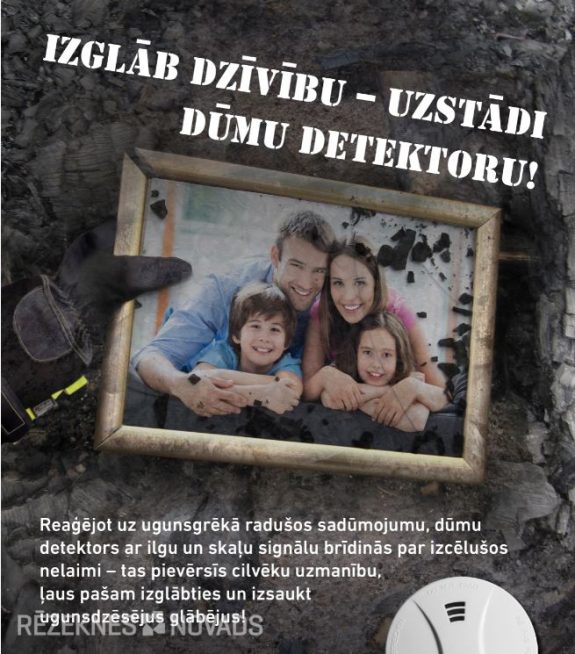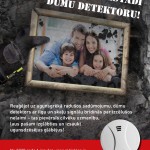As from 1 January 2020, the requirements for fire safety in dwellings will become stricter

On 1 January of the following year, the relevant requirements of fire safety regulations will enter into force – in all dwellings (both in private houses and apartments) there must be autonomous fire detectors who respond to smoke, while private houses must be provided with fire extinguishers.
The Chief of State Fire-Fire and Rescue Service (VUGD), General Oscars clover: “Fire safety is very important for the day of society, as every person can be found to be a fire accident when not only the entire life of the dwelling is lost in a short time, but also the life of the man!” A couple of tens of euros can save many lives! I call for the beginning of 2020, but today we are going to take care of fire safety - install smoke detector and buy fire extinguishers for their dwelling! '
Recommendations will become mandatory requirements
In 2016, when the current version of the fire safety regulations came into force, the regulations provided for the time of adaptation until 1 January 2020, when the installation of smoke detectors in dwellings and the provision of single-apartment facilities with fire extinguishers from the recommendation on how to take care of fire safety in the dwelling would become mandatory.
The statistics available TO VUGD indicate that the smoke detectors were not installed in most cases where the fires died or damaged. THE VUGD calls for no concern for the safety of his and her co-workers, as well as being co-responsible, as each of his own forces is responsible for the fire safety in the dwelling, for example by installing smoke detector, which will signal a high-pitched sound with a shrill sound and allow time to leave the dangerous spaces in time to protect health or even life.
Foreign experience shows that the installation of smoke detectors in dwellings up to 75% reduces the number of fires killed in fires. One of the countries where such a requirement has proven its effectiveness and significantly reduced the number of deaths is Estonia.
Smoke detector must be in each dwelling
An autonomous fire detector responding to smoke is a small device capable of detecting fire factors (smoke concentration, heat) in the room independently and giving an 80 dB sound signal for approximately half an hour continuously to warn the occupants of the dwelling.
The smoke detector is to be purchased at various trading venues. It shall bear THE CE marking and the information on the conformity of the detector with European Standard EN 14604. The design of the transducer is relatively simple: it is attached to the ceiling with screws attached to the kit or double-adhesive tape.
It should be added that at least one smoke detector must be installed in the apartments, but it must be installed on each floor of the building in the private house. The detector must be located at the ceiling in areas where the occupants of the dwelling are predominantly sleeping or staying. The autonomous fire detectors operate on batteries, so it will be necessary to replace the battery in time, which will also be reminded by the transducer itself, sending short sound signals, as well as occasionally checking the detector's workload with the control button.
Private houses must be provided with fire extinguisher
In contrast, a fire extinguisher in a private house will be useful for the deletion of a small fire at the start of its ignition. It should be recalled that the fire extinguisher may only be used if the deletion does not endanger health and life. If there is a fire accident, consider the situation and do not endanger yourself, but call the single emergency call number 112 immediately and call the firefighters!
When purchasing a fire extinguisher, attention must be paid to the incorporation of the individual or batch number and THE CE marking of conformity on its body. In turn, the extinguishing capacity of a fire extinguisher must be at least 21A 113B (where the figure means how much fire can be extinguished, but the letter fire class: A – when solid, organic materials, B – when the liquids are deg, inciting solid objects).
When maintaining a fire extinguisher, the housekeeper will have to carry out visual inspection (whether the apparatus is damaged and the pressure display is appropriate), but the maintenance must be carried out at certified service points in accordance with the time limit laid down by the manufacturer or, if not specified, every five years.
How will VUGD control if smoke detectors are installed in dwellings?
The requirements of fire safety regulations are not designed to punish people. The regulations include fire safety measures, which will help to avoid or mitigate the effects of fire.
We explain that VUGD does not plan to check every dwelling. Priority checks will be carried out in the dwellings for which applications or complaints will be received or fires. As far as possible, the survey of the residential sector will be carried out and not only the presence of smoke detectors, but also the fulfilment of other fire safety requirements in housing and shared facilities. The auditing of the residential sector will be nothing new and will be held every year and will continue to happen.
How much penalties are planned for non-fitting of non-installed detectors or other requirements in the fire safety regulations?
Article 179 of the Code of Administrative Violations provides that: “in respect of infringement of fire safety requirements, a fine shall be imposed on natural persons from thirty to two hundred and eighty euros, for legal persons from two hundred and eighty to one thousand four hundred euros”. For comparison, the purchase of one smoke detector cost approximately five to ten euros.
For more information:
Inta Palatinate
VUGD prevention and public information division
Tel. 67075871, inta.palkavniece@vugd.gov.lv
